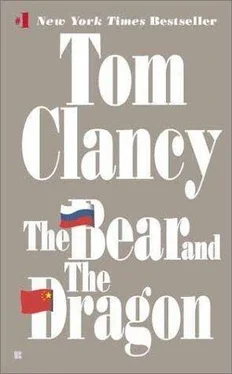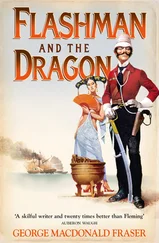Tom Clancy - The Bear and the Dragon
Здесь есть возможность читать онлайн «Tom Clancy - The Bear and the Dragon» весь текст электронной книги совершенно бесплатно (целиком полную версию без сокращений). В некоторых случаях можно слушать аудио, скачать через торрент в формате fb2 и присутствует краткое содержание. Год выпуска: 2001, ISBN: 2001, Жанр: Триллер, на английском языке. Описание произведения, (предисловие) а так же отзывы посетителей доступны на портале библиотеки ЛибКат.
- Название:The Bear and the Dragon
- Автор:
- Жанр:
- Год:2001
- ISBN:780425180969
- Рейтинг книги:3 / 5. Голосов: 1
-
Избранное:Добавить в избранное
- Отзывы:
-
Ваша оценка:
- 60
- 1
- 2
- 3
- 4
- 5
The Bear and the Dragon: краткое содержание, описание и аннотация
Предлагаем к чтению аннотацию, описание, краткое содержание или предисловие (зависит от того, что написал сам автор книги «The Bear and the Dragon»). Если вы не нашли необходимую информацию о книге — напишите в комментариях, мы постараемся отыскать её.
The Bear and the Dragon — читать онлайн бесплатно полную книгу (весь текст) целиком
Ниже представлен текст книги, разбитый по страницам. Система сохранения места последней прочитанной страницы, позволяет с удобством читать онлайн бесплатно книгу «The Bear and the Dragon», без необходимости каждый раз заново искать на чём Вы остановились. Поставьте закладку, и сможете в любой момент перейти на страницу, на которой закончили чтение.
Интервал:
Закладка:
That surprised Reilly. He’d thought Murray was tight with the President, but supposed now that this information was too compartmentalized.
I’ll take that,” Colonel Aliyev said to the communications officer.
“It’s for the immediate attention of-”
“He needs sleep. To get to him, you must go through me,” the operations officer announced, reading through the dispatches. “This one can wait … this one I can take care of. Anything else?”
“This one’s from the President!” “President Grushavoy needs a lucid general more than he needs an answer to this, Pasha.” Aliyev could use some sleep, too, but there was a sofa in the room, and its cushions were calling out to him.
“What’s Tolkunov doing?”
“Updating his estimate.”
“Is it getting better in any way?” Comms asked.
“What do you think?” Ops replied.
“Shit.”
“That’s about right, comrade. Know where we can purchase chopsticks for us to eat with?”
“Not while I have my service pistol,” the colonel replied. At nearly two meters in height, he was much too tall to be a tanker or an infantryman. “Make sure he sees these when he wakes. I’ll fix it with Stavka.”
“Good. I’m going to get a few hours, but wake me, not him,” Aliyev told his brother officer.
“ Da .”
They were small men in the main. They started arriving at Never, a small railroad town just east of Skovorodino, on day coaches tacked onto the regular rail service on the Trans-Siberian Railroad. Getting off, they found officers in uniform directing them to buses. These headed down a road paralleling the railroad right-of-way southeast toward a tunnel drilled ages before in the hills over the diminutive Urkan River. Beside the tunnel was an opening which appeared to the casual viewer to be a siding for service equipment for the railroad. And so it was, but this service tunnel went far into the hillside, and branching off it were many more, all constructed in the 1930s by political prisoners, part of Iosef Stalin’s gulag labor empire. In these man-made caverns were three hundred T-55 tanks, built in the mid-1960s and never used, but rather stored here to defend against an invasion from China, along with a further two hundred BTR-60 wheeled infantry carriers, plus all the other rolling stock for a Soviet-pattern tank division. The post was garrisoned by a force of four hundred conscripts who, like generations before them, served their time servicing the tanks and carriers, mainly moving from one to another, turning over the diesel engines and cleaning the metal surfaces, which was necessary because of water seepage through the stone roof. The “Never Depot,” it was called on classified maps, one of several such places close to the main rail line that went from Moscow to Vladivostok. Cunningly hidden, partially in plain sight, it was one of the aces that General-Colonel Bondarenko had hidden up his sleeve.
As were the men. They were mostly in their thirties, confused, and more than a little angry at having been called away from their homes. However, like good Russians, or indeed good citizens in any land, they got their notices, figured that their country had a need, and it was their country, and so about three-fourths of them went as summoned. Some saw familiar faces from their time in the conscript army of the Soviet Union-these men were mainly from that time-and greeted old friends, or ignored those less happily remembered. Each was given a preprinted card telling him where to go, and so the tank crews and infantry squads formed up, the latter finding their uniforms and light weapons, plus ammunition, waiting in the assigned motor-carrier. The tank crewmen were all small men, about 167 centimeters in height-about five feet six inches to an American-because the interiors of the old Russian tanks did not permit tall men to fit inside.
The tankers returning to the steeds of their youth knew the good and bad points of the T-55s. The engines were made of roughly machined parts and would grind off a full kilogram of metal shavings into the oil sumps during the first few hours of running, but, they all figured, that would have been taken care of by the routine turning-over of the engines in the depot. The tanks were, in fact, in surprisingly good shape, better than the ones they’d used on active duty. This seemed both strange and unsurprising to the returning soldiers, because the Red Army had made little logical sense when they’d been in it, but that, for a Soviet citizen of the 1970s and ’80s, was not unexpected either. Most remembered their service with some fondness, and for the usual reasons, the chance to travel and see new, different things, and the comradeship of men their own age-a time of life in which young men seek out the new and the exciting. The poor food, miserable pay, and strenuous duty were largely forgotten, though exposure to the rolling equipment brought back some of it with the instant memory that accompanied smells and feels from the past. The tanks all had full internal fuel tanks, plus the oil drums affixed to the rear that had made all of the men cringe when thinking about a battlefield-one live round could turn every tank into a pillar of fire, and so that was the fuel you burned off first, just so you could pull the handle to dump the damned things off when the first bullet flew.
Most agreeably of all, those who pressed the start buttons felt and heard the familiar rumble after only a few seconds of cranking. The benign environment of this cavern had been kind to these old, but essentially unused, tanks. They might have been brand new, fresh from the assembly lines of the massive factory at Nizhnyi Tagil, for decades the armory of the Red Army. The one thing that had changed, they all saw, was that the red star was gone from the glacis plate, replaced with an all-too-visible representation of their new white-blue-red flag, which, they all thought, was far too good an aiming point. Finally they were all called away from their vehicles by the young reserve officers, who, they saw, looked a little worried. Then the speeches began, and the reservists found out why.
Damn, isn’t she a lovely one,” the FSS officer said, getting into the car. They’d followed their subject to yet another expensive restaurant, where he’d dined alone, then walked into the bar, and within five minutes fixed upon a woman who’d also arrived alone, pretty in her black, red-striped dress that looked to have been copied from some Italian designer. Suvorov/Koniev was driving back toward his flat with a total of six cars in trail, three of them with light-change switches on their dashboards to alter their visual appearance at night. The cop riding in the number-two car thought that was an especially clever feature.
He was taking his time, not racing his car to show his courage, but instead dazzling the girl with his man-of-the-world demeanor, the investigators thought. The car slowed as it passed one corner, a street with old iron lampposts, then changed direction, if not abruptly, then unexpectedly.
“Shit, he’s going to the park,” the senior FSS guy said, picking up his radio microphone to say this over the air. “He must have spotted a flag somewhere.”
And so he did, but first he dropped off what appeared to be a very disappointed woman, holding some cash in her hand to ease the pain. One of the FSS cars paused to pick her up for questioning, while the others continued their distant pursuit, and five minutes later, it happened. Suvorov/ Koniev parked his car on one side of the park and walked across the darkened grass to the other, looking about as he did so, not noticing the fact that five cars were circling.
“That’s it. He picked it up.” He’d done it skillfully, but that didn’t matter if you knew what to look for. Then he walked back to his car. Two of the cars headed directly over to his flat, and the three in trail just kept going when he pulled in.
Читать дальшеИнтервал:
Закладка:
Похожие книги на «The Bear and the Dragon»
Представляем Вашему вниманию похожие книги на «The Bear and the Dragon» списком для выбора. Мы отобрали схожую по названию и смыслу литературу в надежде предоставить читателям больше вариантов отыскать новые, интересные, ещё непрочитанные произведения.
Обсуждение, отзывы о книге «The Bear and the Dragon» и просто собственные мнения читателей. Оставьте ваши комментарии, напишите, что Вы думаете о произведении, его смысле или главных героях. Укажите что конкретно понравилось, а что нет, и почему Вы так считаете.






![Александр Ирвин - Tom Clancy’s The Division 2. Фальшивый рассвет [litres]](/books/417744/aleksandr-irvin-tom-clancy-s-the-division-2-falsh-thumb.webp)




